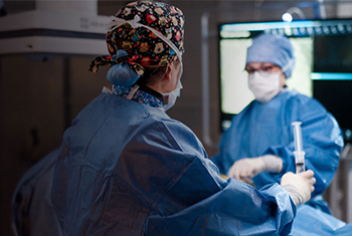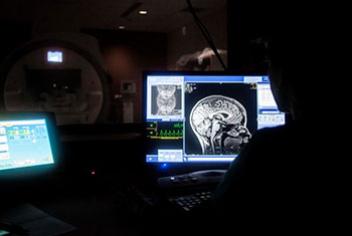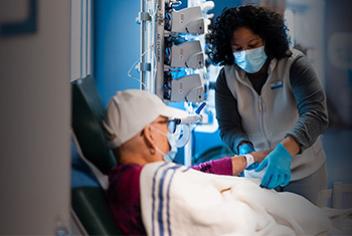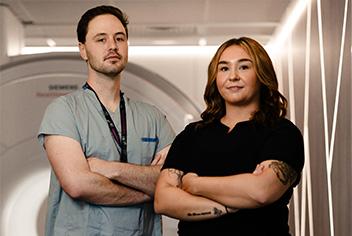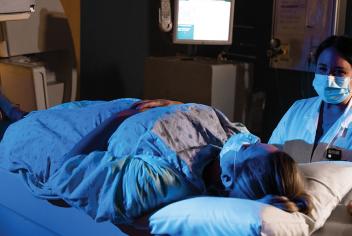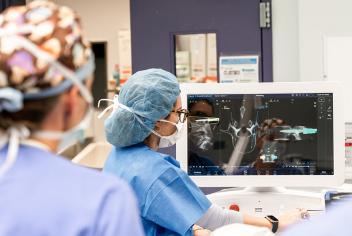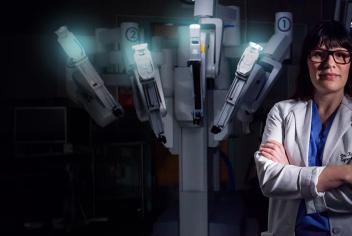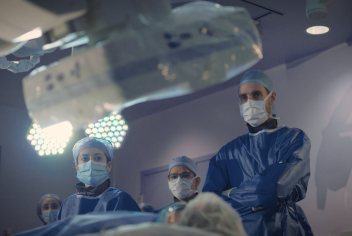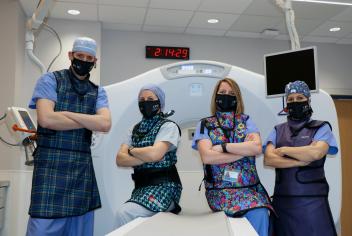-

We Are Campaign
Health care in our province is changing. The We Are campaign presents a once-in-a-generation opportunity. Will you step up in the name of better health care?

Funding a world’s first cancer-fighting technology and its accompanying research that has the potential to reduce radiation treatments from 25 to 5 for certain cancers and transform cancer care on a global scale.

Funding Atlantic Canada’s first surgical robotics technology, providing the most advanced, minimally-invasive surgeries for prostate, kidney, gynecological and ear, nose and throat (ENT) cancers.

Equipping Atlantic Canada’s first hybrid operating room with the most leading-edge technology – combining the features of a standard OR, a cardiac catheterization lab and an imaging suite.
Bringing two state-of-the-art CT simulators to the QEII Cancer Centre. This radiation planning technology will create advanced precision, helping care teams deliver the most targeted radiation treatment for up to 3,000 patients annually.
Unlocking access to Canada’s first spinal robot for patient care, allowing QEII teams to perform the most precise, personalized surgeries possible that result in shorter hospital stays, recovery times and more.

Fueling the purchase of Canada’s second orthopaedic surgical robot and its accompanying research, providing robot-assisted knee and hip replacements customized for each patient’s anatomy.
Funding Atlantic Canada's first-ever CAR-T therapy lab at the QEII; a state-of-the-art space dedicated to preparing this lifesaving immunotherapy which is a final lifeline for certain blood cancer patients who’ve tried all other treatment options

Doubling preparation capacity and unlocking access to more clinical trials by funding equipment and technology within this leading-edge space where all chemotherapy and systemic therapy doses are prepared for QEII patients.

Equipping the QEII’s expanded IR suites with advanced technology for more minimally-invasive procedures than ever before and a new dedicated recovery area – impacting patients with stroke, cancer and more.
Unlocking precision beyond the human hand with robotics technology that helps surgeons place electrodes within the brain – allowing them to pinpoint the exact location of a patient’s seizures for future treatments.

Purchasing a best-in-class genetic sequencing machine that can help inform how a patient’s cancer might progress and the most effective treatment options.
A research position funded in perpetuity, the Chair will be a nation-leading model for the investigation and treatment of mental health and addictions — focusing on marginalized populations and rural communities.
Fueling research grants to develop and implement new approaches, advanced technologies, inclusive research, and policies to mitigate implicit bias in the healthcare system.
Supporting Nova Scotia’s first hospital-based rTMS clinics in Dartmouth and Kentville, providing free access for patients with treatment-resistant depression.

Introducing same-day, virtual treatment options for those requiring mild to moderate mental health care – providing 24/7 access across Nova Scotia.
Transforming and modernizing the province’s only specialized rehabilitation centre to support patients as they work towards their recovery goals following a life-altering illness or injury.

Ensuring the most state-of-the-art PET-CT imaging technology is available, allowing teams to detect smaller traces of cancer and significantly improve diagnostic imaging wait times.
Funding tissue marker technology called MOLLI (magnetic occult lesion localization instrument) at the QEII and in rural Nova Scotia that helps target breast cancer lesions with incredible precision during surgery.
Recruiting and retaining internationally-educated and trained healthcare workers through Nova Scotia’s International Community of Healthcare Workers Engagement program.
Transforming the QEII’s new Psychiatric Emergency Care Suites, providing a more comforting and non-stigmatizing environment for those facing mental health crises.

Outfitting the QEII’s Gynecoloscopy Clinic with minimally-invasive detection tools to diagnose and prevent cervical cancer.
Acquiring new diagnostic imaging technology that will reduce wait times for patients during their rehabilitation journey, while supporting training opportunities for the next generation of medical technologists.

Transforming the Abbie J. Lane gym into a welcoming, purpose-built space that supports recovery — with updated design, equipment and safety features for patients receiving mental health and addictions care.

Introducing Atlantic Canada’s first gallium dotatate technology to detect and evaluate neuroendocrine tumours with unparalleled accuracy.

Supporting a pan-Canadian research project to accelerate precision medicine for Atlantic Canadian cancer patients, as part of a national Terry Fox Research Institution initiative.
Funding leading-edge simulation and training technology for stroke care, helping teams remove blood clots quickly, confidently and with better patient outcomes.
Introducing a text-based, e-Mental health tool that sends automated, daily text messages to people currently accessing mental health services across Nova Scotia.
Empowering young people to actively get involved and share their solution-focused ideas on improving mental health supports
Supporting a test-and-try app-based wayfinding solution to be launched at the QEII's Halifax Infirmary site.
The We Are campaign was born out of a once-in-a-generation opportunity when the government made a commitment to redevelop the QEII. The new QEII will have an increased number of beds and operating rooms, a new emergency department, and floors upon floors of new space for cancer and ambulatory care. The QEII will also continue to expand its reach into the community to offer its services, increasing access to care.



